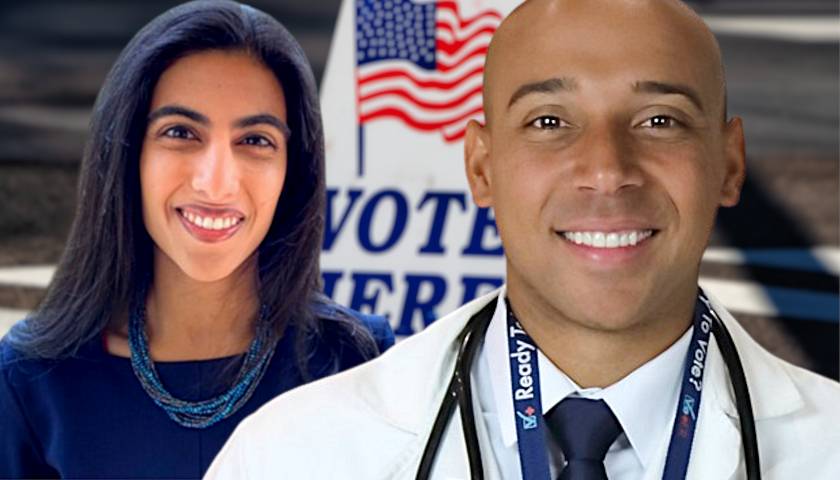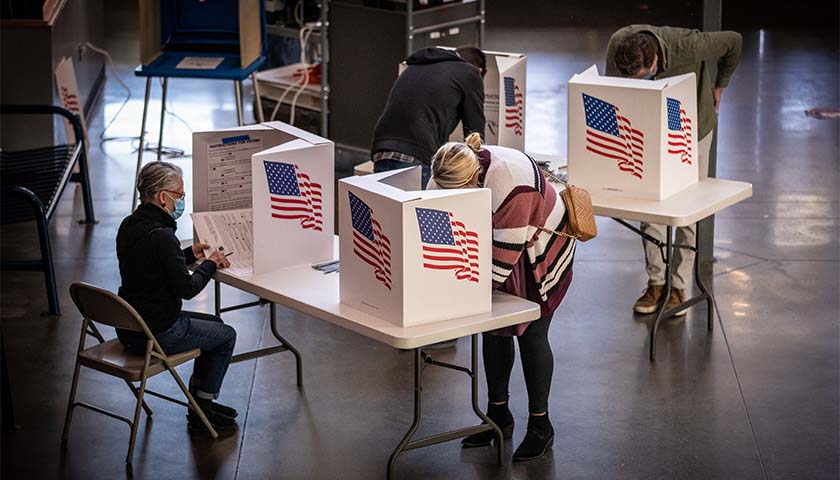by Natalia Mittelstadt
Federally Qualified Health Centers (FQHCs) are partnering with a left-wing nonprofit for voter registration efforts as part of “Bidenbucks,” which is President Biden’s executive order to turn as many federal agencies as possible into get-out-the-vote (GOTV) centers across all states.
Health centers that are funded by the federal government and serve low-income patients are working with a progressive nonprofit on voter registration efforts to implement Biden’s wide-ranging executive order to use the federal government to register voters.
Vot-ER, a left-wing nonprofit, works with FQHCs across the country to register voters who are patients of these health centers. The nonprofit attended a Department of Justice meeting with other left-wing organizations to assist in the GOTV efforts that the Biden administration is implementing in federal agencies.
According to HealthCare.gov, FQHCs are “Federally funded nonprofit health centers or clinics that serve medically underserved areas and populations. Federally qualified health centers provide primary care services regardless of your ability to pay.”
The website for Medicaid and CHIP Payment and Access Commission notes that FQHCs “provide care in underserved areas” and that “State Medicaid programs are required to cover services furnished by FQHCs.”
In March 2021, Biden signed Executive Order 14019, often referred to by critics as “Bidenbucks,” which alludes to “Zuckerbucks,” the approximately $400 million from Facebook founder Mark Zuckerberg widely alleged to have been funneled through left-leaning nonprofits to turn out the Democratic vote in the 2020 presidential election.
According to the Executive Order, “The head of each agency shall evaluate ways in which the agency can, as appropriate and consistent with applicable law, promote voter registration and voter participation,” including “soliciting and facilitating approved, nonpartisan third-party organizations and State officials to provide voter registration services on agency premises.”
Similar to “Bidenbucks,” “Zuckerbucks” drew attention when the Center for Tech and Civic Life (CTCL) poured about $350 million into local elections offices managing the 2020 election, with most of the funds donated to the nonprofit by Zuckerberg. The nonprofit has claimed its 2020 election grants were allocated allegedly without partisan preference to make voting safer amid the pandemic.
However, a House Republican investigation found that less than 1 percent of the funds were spent on personal protective equipment. Most of the funds were focused on get-out-the-vote efforts and registrations in areas heavily leaning towards Democratic party candidates.
Controversy followed after evidence came to light surrounding the disproportionate private funding funneled to Democratic-leaning jurisdictions and claims the imbalance helped sway the 2020 election in Biden’s favor. 28 states have either restricted or banned the use of private money to fund elections, while 12 individual counties have also restricted or banned the funds, according to the Capital Research Center.
According to public records obtained by the Heritage Foundation’s Oversight Project, the DOJ had a “listening session” in July 2021 with multiple non-governmental organizations (NGOs) regarding the implementation of “Bidenbucks.”
Heritage found that every NGO participant whose political donation history or party affiliation could be identified was Democrat except for a Green Party member.
One of those NGOS was Vot-ER, which claims to be “a nonpartisan, nonprofit organization working to integrate civic engagement into healthcare,” according to its website.
Vot-ER says it “develops nonpartisan civic engagement tools and programs for every corner of the healthcare system—from private practitioners to medical schools to hospitals.”
Those who work with Vot-ER are “united by a common vision: healthy communities powered by inclusive democracy,” the group’s website claims.
Vot-ER advertises that it has programs in “over 500 hospitals and clinics” across 43 states and Washington, D.C., “and helped tens of thousands of Americans register and prepare to vote.”
Three of Vot-ER’s programs are the Community Civic Engagement Program, Vot-ER Badges, and the Civic Health Fellowship.
The Community Civic Engagement Program is Vot-ER’s “flagship small grant program that expands non-partisan civic engagement through voter registration and turnout initiatives in community health centers.” Vot-ER collaborates with the National Association of Community Health Centers (NACHC) and AltaMed for the program that works with “Community Health Centers, Federally Qualified Health Centers, and other similar organizations.”
The grants range from $5,000 to $10,000 and are offered “to participating partners, enabling them to integrate civic engagement initiatives into their existing healthcare center operations.” The initiatives covered by the grants “include non-partisan voter registration and voter turnout drives.”
The Vot-ER badges are worn by healthcare professionals and have QR codes on them that patients can scan “to access a non-partisan, self-service voter platform where they can register, request a mail-in ballot, and learn about upcoming elections.”
However, according to a document by NACHC titled “Voter Registration: Community Health Center Best Practices” on Vot-ER’s website, healthcare staff are advised on how “To avoid the appearance that health center staff might be suggesting how registrants should vote.”
Healthcare workers are advised against “Allowing providers and other staff to wear the VotER lanyard with the QR code and text message while on the job; Using Telehealth visits to promote voter registration; Having staff other than those who have received appropriate training from advocating to patients to register to vote orally or in writing.”
The Civic Health Fellowship is an eight-month program where healthcare providers are “trained and equipped to ignite change” in their communities “through voter engagement.”
Community organizing instructors will teach the fellows, who “will emerge with a profound understanding of civic involvement, health equity concerns, and effective community mobilization techniques.”
Participating fellows will also gain a “[d]eeper knowledge of health disparities and medical racism—and how we can fight against it in our daily work.”
The founder of Vot-ER is Alister Martin (pictured above, right), a physician who was a White House fellow for the 2021-2022 class and placed at both the Office of the Vice President and the White House Office of Public Engagement. Federal Election Commission records show that Alister Martin, the founder and chairman of Vote-ER has donated campaign contributions exclusively to Democratic Party Candidates.
Martin is also on an Advisory Panel on Outreach and Education for the Centers for Medicare & Medicaid Services under the Department of Health and Human Services.
Vot-ER didn’t respond to a request for comment from Just the News by presstime, but Vot-ER Executive Director Aliya Bhatia (pictured above, left) told the Washington Examiner in a statement, “We ensure that our voter engagement efforts do not support or oppose any political party or candidate. Our focus is on connecting voter registration and health-related outcomes.”
– – –
Natalia Mittelstadt graduated from Regent University with Bachelor of Arts degrees in Communication Studies and Government.
Photo “Alister Martin” by Alister Martin. Photo “Aliya Bhatia” by Vot-ER. Background Photo “Vote Sign” by Tony Webster. CC BY 2.0.




